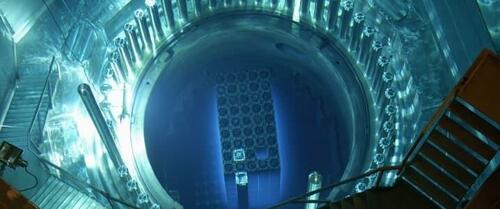
By Charles Kennedy of OilPrice.com,
Switzerland’s nuclear power plant operators plan to keep the facilities operational for longer than initially planned, spokespeople for the large Swiss utilities Axpo Holding and Alpiq Holding told Bloomberg on Tuesday.
Switzerland has four nuclear reactors, which generate up to 40% of its electricity, according to the World Nuclear Association.
The Swiss voted in a 2017 referendum to phase out nuclear power but Switzerland has not set a deadline for this and it’s up to operators to decide how long they could operate the plants safely.
Now the energy crisis and concerns about the reliability of electricity supply in the country has prompted utilities to look to extend the lives of the reactors as long as the extension of the operations is found to be safe.
Axpo Holding and Alpiq Holding have increased the planned lifespan for their nuclear power plants to 60 years from a previous target of 50 years, which means they could be in operation until around 2040, according to the spokespeople who spoke to Bloomberg.
Alpiq is also considering an extension to as many as 80 years and is studying the possible impacts of such an extension on safety, investments, and profitability, the Alpiq spokesperson told Bloomberg.
Several countries in Europe also plan to keep nuclear power use for longer, including France, a large nuclear power generating country.
But Germany, Europe’s largest economy, earlier this year ditched nuclear energy after taking its last three nuclear power plants offline in April, ending more than six decades of commercial nuclear energy use.
Switzerland, for its part, has been trying to cope with last year’s energy crisis.
The country has recently repealed an ordinance from 2022 allowing drawdowns from its strategic fuel stockpiles after supply of petroleum products has now normalized. Last year, Switzerland started to release oil from its emergency reserves as it lowered the obligatory levels of petroleum stocks by 6.5% due to low water levels on the Rhine River and chaos in railway transportation.
By Charles Kennedy of OilPrice.com,
Switzerland’s nuclear power plant operators plan to keep the facilities operational for longer than initially planned, spokespeople for the large Swiss utilities Axpo Holding and Alpiq Holding told Bloomberg on Tuesday.
Switzerland has four nuclear reactors, which generate up to 40% of its electricity, according to the World Nuclear Association.
The Swiss voted in a 2017 referendum to phase out nuclear power but Switzerland has not set a deadline for this and it’s up to operators to decide how long they could operate the plants safely.
Now the energy crisis and concerns about the reliability of electricity supply in the country has prompted utilities to look to extend the lives of the reactors as long as the extension of the operations is found to be safe.
Axpo Holding and Alpiq Holding have increased the planned lifespan for their nuclear power plants to 60 years from a previous target of 50 years, which means they could be in operation until around 2040, according to the spokespeople who spoke to Bloomberg.
Alpiq is also considering an extension to as many as 80 years and is studying the possible impacts of such an extension on safety, investments, and profitability, the Alpiq spokesperson told Bloomberg.
Several countries in Europe also plan to keep nuclear power use for longer, including France, a large nuclear power generating country.
But Germany, Europe’s largest economy, earlier this year ditched nuclear energy after taking its last three nuclear power plants offline in April, ending more than six decades of commercial nuclear energy use.
Switzerland, for its part, has been trying to cope with last year’s energy crisis.
The country has recently repealed an ordinance from 2022 allowing drawdowns from its strategic fuel stockpiles after supply of petroleum products has now normalized. Last year, Switzerland started to release oil from its emergency reserves as it lowered the obligatory levels of petroleum stocks by 6.5% due to low water levels on the Rhine River and chaos in railway transportation.
Loading…



